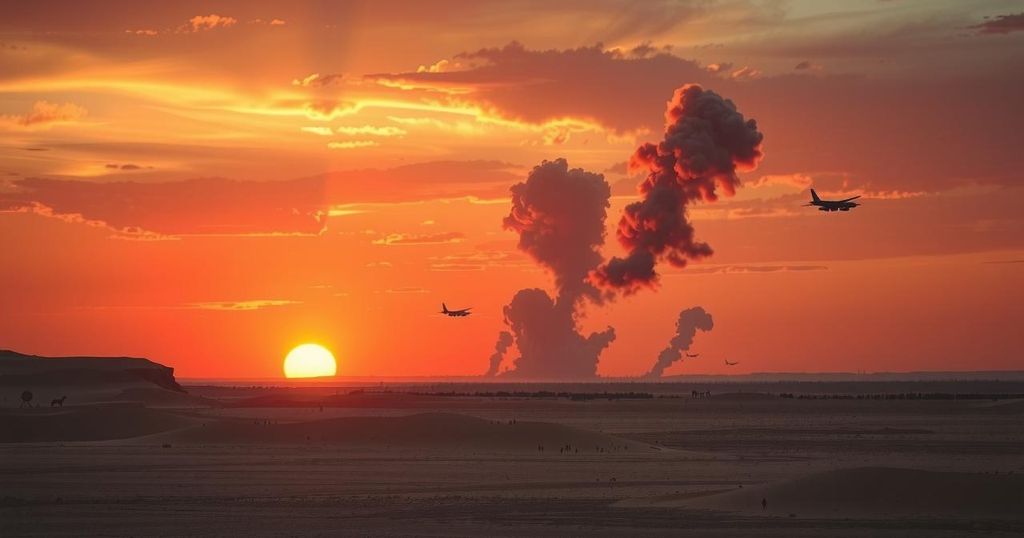The United States has commenced indefinite airstrikes against Yemen’s Houthi rebels in retaliation for attacks on shipping. This military action marks Trump’s first use of U.S. force in the region since January. Despite the strikes, the Houthis maintain their resistance amid escalating tensions with Iran and the U.S., raising concerns for regional stability and humanitarian impacts.
On Saturday, United States officials announced that airstrikes against Yemen’s Houthi rebels, backed by Iran, will continue indefinitely. These strikes aim to retaliate against Houthi attacks on shipping in the Red Sea, resulting in the death of at least 31 individuals and injuring up to 100. This represents President Donald Trump’s initial military action in the region since assuming office in January.
U.S. Defense Secretary Pete Hegseth communicated through Fox News that “the minute the Houthis say ‘we’ll stop shooting at your ships, we’ll stop shooting at your drones’, this campaign will end.” He emphasized that the campaign will persist until the Houthis cease their aggressive actions. This operation signals a more intense U.S. stance towards Iran and the broader Middle East, according to various senior officials.
National Security Adviser Michael Waltz elaborated on the operations, noting they “targeted multiple Houthi leaders and took them out” with overwhelming force, effectively warning Iran that the U.S. has reached its limit. In a message to the Houthis, President Trump declared, “YOUR TIME IS UP, AND YOUR ATTACKS MUST STOP, STARTING TODAY,” reinforcing the U.S. resolve to act against the threat posed by the Houthis.
The Houthis, having gained control over significant portions of Yemen over the past decade, justified their attacks on international shipping as acts of solidarity with Palestinians and Hamas. They have extended their campaigns to include missile strikes against Israel amid the Gaza conflict. Israeli authorities reported assessing a missile that was launched from Yemen and landed near Sharm el-Sheikh, Egypt, to determine if it targeted Israel.
In response to the U.S. airstrikes, Iran’s Revolutionary Guards asserted the independence of the Houthis in strategic decision-making. Iran’s foreign ministry condemned the airstrikes, characterizing them as a violation of international law and reiterated its support for the Houthis, with Foreign Minister Abbas Araghchi stating the U.S. should cease interference in Iranian foreign policy.
Amidst rising tensions, the U.S. military has already enhanced sanctions against Iran while pursuing negotiations regarding its nuclear program. Observers speculate whether President Trump might consider military action against Iran in the future under influential pressures. The U.S. Central Command described the recent airstrikes as the commencement of a wide-ranging operation in Yemen, possibly extending over weeks.
The Houthis remain a crucial component of the Iranian-backed “axis of resistance,” continuing to show resilience despite the regional challenges faced by other militant groups such as Hamas and Hezbollah. Reports indicate that the airstrikes disproportionately affected civilians, with many of the casualties being women and children. Houthi representatives condemned the actions as a “war crime.”
Locals reported the intensity of the strikes, with one resident, Abdullah Yahia, describing how the explosions felt as though they shook the neighborhood. Recovery efforts in the aftermath illustrated the destruction, with emergency workers tending to the injured at hospitals. The previous U.S. administration had limited military engagements aimed at the Houthis, but the current administration’s actions mark a significant escalation in military involvement in the region.
Recent announcements from the Houthis indicated a return to targeting Israeli maritime vessels, ending a period of relative calm established since a ceasefire during the Gaza conflict. The Pentagon has tracked a significant increase in Houthi attacks on U.S. and commercial vessels in recent months, underscoring the escalating conflict in the region.
The ongoing U.S. airstrikes against the Houthis signify a notable shift in military strategy under the Trump administration, aiming to deter aggressive actions against international shipping linked to Iran. The escalating violence highlights the humanitarian implications, with significant civilian casualties reported. Increased tensions in the region raise critical questions about future U.S.-Iran relations and the potential impact on broader Middle Eastern stability, as the Houthis reaffirm their commitment to their campaigns amidst international condemnation.
Original Source: www.theguardian.com






